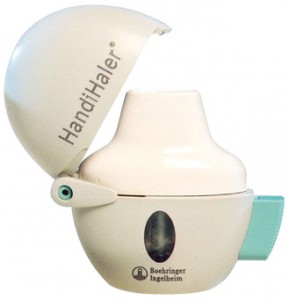Warnings & Recalls for Spiriva
FDA and Spiriva
In 2008 the FDA alerted the public about a possible increase in
cardiovascular problems, such as a heart attack or stroke. However, in 2010, these statements were revoked as the FDA investigated this risk and determined that Spiriva was not linked to these cases.
Pregnancy and Spiriva
Spiriva has been assigned as an FDA
pregnancy Category C drug. Studies
do not confirm if Spiriva may be harmful to the fetus if taken during pregnancy. It is unknown if Spriva transfers through breast milk or could cause harm to a nursing baby. If you are
pregnant,
may become pregnant, or are
breastfeeding, consult your doctor before taking Spiriva.
General Warnings
Do not use Spiriva if you are allergic to any ingredient in Spiriva. Before taking Spiriva, let your doctor know about your
medical history, be sure to include information about:
- any allergies you may have (especially to milk produces)
- kidney disease
- narrow angle-glaucoma
- an enlarged or swollen prostate
- any blockages of the bladder
Spiriva Interactions
Tell your healthcare provider about
any medicines you are currently taking, as the following may interact with Spiriva:
- atropine
- atropa belladonna
- anticholinergics
- anti-nausea drugs
- methscopolamine
- scopolamine
- any other medicines for breathing disorders
- treatments for allergies or colds
- irritable bowel syndrome drugs
- corticosteroids (steroids)
- ulcer treatments
- medications for treating bladder or urinary problems
Spiriva Treatment and Use
Spiriva | tiotropium is an oral inhalant bronchodilator marketed by Pfizer Inc. for treating breathing disorders and their symptoms, such as wheeziness, trouble breathing, and feeling short of breath. Spiriva may be prescribed to patients with the following conditions:
- chronic obstructive pulmonary disease (CPPD)
- chronic bronchitis
- emphysema
Spiriva does not treat spasms that have already begun.
How Does Spiriva Work?
Spiriva works by attaching to receptors in the airways which cause symptoms of breathing disorders. Spiriva prevents this action and allows muscles to relax, creating more open passageways and resulting in easier breathing.
How to Use Spiriva
Spiriva comes in capsule form to be placed inside a special inhaler (HandiHaler). Do not swallow the capsules. The capsules contain dry powder to be breathed in once daily. Use Spiriva at the same time each day as prescribed by your doctor. Read and follow all packaged instructions and directions given to you by your doctor.
Do not use more Spiriva that prescribed, you may be at risk of an overdose.
Spiriva is not a replacement for a fast-acting inhaler.
 Serious Side Effects of Spiriva
Serious Side Effects of Spiriva